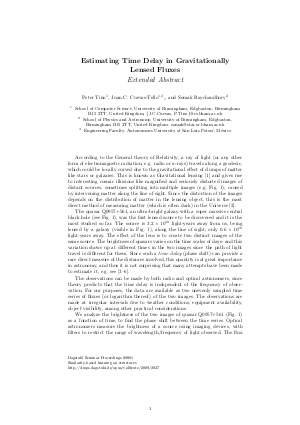Estimating Time Delay in Gravitationally Lensed Fluxes
Authors Peter Tino, Juan C. Cuevas-Tello, Somak Raychaudhury
-
Part of:
Volume:
Dagstuhl Seminar Proceedings, Volume 9081
Part of: Series: Dagstuhl Seminar Proceedings (DagSemProc) - License:
 Creative Commons Attribution 4.0 International license
Creative Commons Attribution 4.0 International license
- Publication Date: 2009-06-23
File

PDF
DagSemProc.09081.5.pdf
- Filesize: 112 kB
- 3 pages
Document Identifiers
Subject Classification
Keywords
- Time series
- kernel regression
- statistical analysis
- evolutionary algorithms
- mixed representation
Metrics
- Access Statistics
-
Total Accesses (updated on a weekly basis)
0PDF Downloads0Metadata Views
Abstract
We study the problem of estimating the time delay between two signals representing delayed, irregularly sampled and noisy versions of the same underlying pattern. We propose a kernel-based technique in the context of an astronomical problem, namely estimating the time delay between two gravitationally lensed signals from a distant quasar. We test the algorithm on several artificial data sets, and also on real astronomical observations. By carrying out a statistical analysis of the results we present a detailed comparison of our method with the most popular methods for time delay estimation in astrophysics. Our method yields more accurate and more stable time delay estimates. Our methodology can be readily applied to current state-of-the-art optical monitoring data in astronomy, but can also be applied in other disciplines involving similar time series data.
Cite As Get BibTex
Peter Tino, Juan C. Cuevas-Tello, and Somak Raychaudhury. Estimating Time Delay in Gravitationally Lensed Fluxes. In Similarity-based learning on structures. Dagstuhl Seminar Proceedings, Volume 9081, pp. 1-3, Schloss Dagstuhl – Leibniz-Zentrum für Informatik (2009)
https://doi.org/10.4230/DagSemProc.09081.5
BibTex
@InProceedings{tino_et_al:DagSemProc.09081.5,
author = {Tino, Peter and Cuevas-Tello, Juan C. and Raychaudhury, Somak},
title = {{Estimating Time Delay in Gravitationally Lensed Fluxes}},
booktitle = {Similarity-based learning on structures},
pages = {1--3},
series = {Dagstuhl Seminar Proceedings (DagSemProc)},
ISSN = {1862-4405},
year = {2009},
volume = {9081},
editor = {Michael Biehl and Barbara Hammer and Sepp Hochreiter and Stefan C. Kremer and Thomas Villmann},
publisher = {Schloss Dagstuhl -- Leibniz-Zentrum f{\"u}r Informatik},
address = {Dagstuhl, Germany},
URL = {https://drops.dagstuhl.de/entities/document/10.4230/DagSemProc.09081.5},
URN = {urn:nbn:de:0030-drops-20378},
doi = {10.4230/DagSemProc.09081.5},
annote = {Keywords: Time series, kernel regression, statistical analysis, evolutionary algorithms, mixed representation}
}
